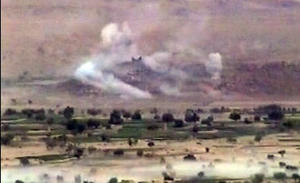AnalysisYemen: the new Afghanistan?
President Barack Obama announced last week the acceleration of the scheduled withdrawal of American troops from Afghanistan; there was an implicit theme in the speech — the fact that Afghanistan has slowly been eclipsed by other countries as a hot-bed for terrorists; continued U.S. preoccupation with Afghanistan would mean that the United States would have fewer resources to devote to these other places; one of these place is Yemen; two weeks ago, the United States let it be know that it was intensifying the UAV campaign against terrorist targets in Yemen — and that the CIA drones would fly to their missions from a secret base in the region

Saudi air strikes against terrorist positions in Yemen // Source: militaryphotos.net
President Barack Obama announced last week the acceleration of the scheduled withdrawal of American troops from Afghanistan. The president did not repeat George W. Bush’s ill-advised “Mission Accomplished” carrier-deck announcement, but instead was more tentative about declaring victory in Afghanistan. If you listened to the speech carefully, you would not be wrong to conclude that the president, rather than say that the United States can now withdraw its troops from Afghanistan because these troops’ work is done, said that the United States had to withdraw its troops because it has other — domestic —needs to which it needs to attend.
There was another implicit theme in the speech — the fact that Afghanistan has slowly been eclipsed by other countries as a hot-bed for terrorists. Continued U.S. preoccupation with Afghanistan would mean that the United States would have fewer resources to devote to these other places.
One of these place is Yemen. Yemen is the poorest country in the Arab world — and it is becoming only poorer. Its oil reserves are dwindling, a weak, ineffective, and thoroughly corrupt central government is becoming weaker, more ineffective, and even more corrupt. Moreover, the Arab Spring has not skipped Yemen, and the last two months saw Yemen become precariously unstable as growing anti-government demonstrations, increased violence by the security services, and mixed and contradictory messages from the president and his supporters about whether or not he — they — would relinquish power and allow for an orderly transition to something resembling a democracy.
It is difficult to imagine what kind of democracy would take hold in Yemen, if at all. The country is deeply and bitterly divided along tribal and regional lines. In 1962 the country broke in two, and a war erupted between the two parts. Egypt, under the charismatic leadership of Gamal abdel Nasser supported the republican side, while Saudi Arabia supported the royalists. It was a bitter war, during which the Egyptian military used chemical munitions against the royalists, an ugly feat Saddam Hussein would repeat against the Kurds and the Iranians two and a half decades later.
Separatist tendencies are never too far below the surface in Yemen, and during the past six years the government has been trying to contain simmering unrest from a growing secessionist movement in the south. A separate conflict — that between the central government and northern rebels — ended only earlier this year, having displaced more
